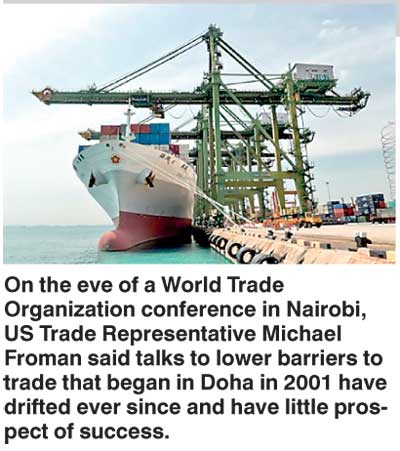Sunday Feb 22, 2026
Sunday Feb 22, 2026
Tuesday, 15 December 2015 00:08 - - {{hitsCtrl.values.hits}}
AFP: The United States called Monday for a fresh start to break a 14-year deadlock in negotiations to free up world trade in goods and services worth some $23 trillion (21 trillion euros).
On the eve of a World Trade Organisation (WTO) conference in Nairobi, US Trade Representative Michael Froman said talks to lower barriers to trade that began in Doha in 2001 have drifted ever since and have little prospect of success.
“Getting it unstuck begins with acknowledging that Doha was designed in a different era, for a different era, and much has changed  since,” he wrote in an opinion piece published in the Financial Times. “It is time for the world to free itself from the strictures of Doha.”
since,” he wrote in an opinion piece published in the Financial Times. “It is time for the world to free itself from the strictures of Doha.”
The trade talks that began in Doha have been driven by a rich-poor split.
They never recovered from a collapse in negotiations in Geneva in 2008, notably because of a dispute over a provision that allows developing countries to erect protective import tariffs on farm goods.
“Now, some emerging markets are the biggest providers of agricultural subsidies but would be exempt under Doha from cuts. If you are a poor farmer facing a global market distortion it does not matter where the subsidies causing it came from. Artificial distinctions between developed and emerging economies make no economic sense,” Froman wrote.
WTO Director-General Roberto Azevedo has said one of the pivotal questions facing member nations when they gather in Nairobi is whether or not to carry on negotiating under the current system, with both the United States and Europe believed to be keen for talks to start again from scratch.
The latest WTO annual report says that in 2014 annual exports in goods was worth $18 trillion and trade in services some $4.9 trillion more.
But with global economic growth slowing as China steps down a gear, trade has a more significant role to play in spurring activity, analysts say.
With Doha talks stalled, many countries have pressed ahead with one-on-one or regional trade agreements covering Asia, the Americas, or the Europe-North America pact now under negotiation, all of which threaten to make the WTO irrelevant if the body cannot revive talks on a global scale, they say.